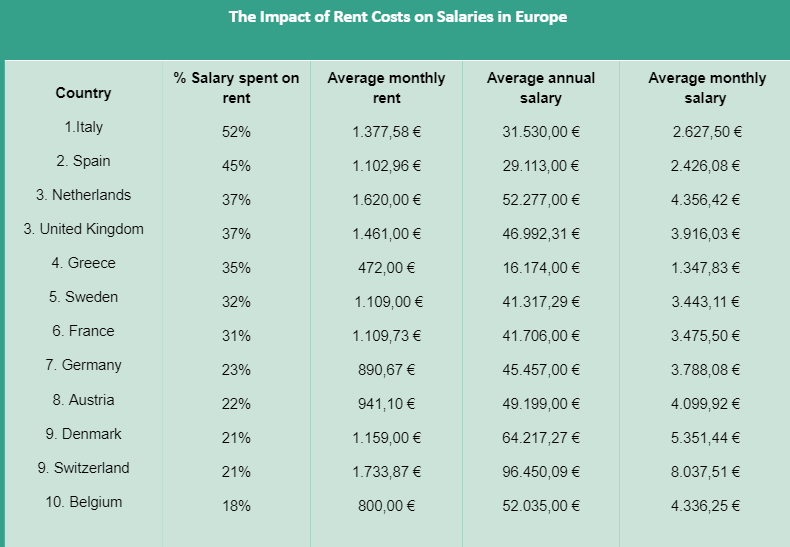Whether you’re considering a move or just dreaming of living in a European country, it’s fascinating to know what are the most liveable countries in Europe and which nations offer the highest quality of life.
Denmark offers the best standard of living based on The Liveability Index, a comprehensive study that ranks 12 European countries against a range of metrics to determine which countries and cities offer the best quality of life for an average citizen.
After evaluating several factors, including electricity and rental costs, inflation rates, average salaries, and overall happiness, Denmark emerged as the top-ranking country in terms of liveability, closely followed by Switzerland in second place.
Both countries have higher average salary levels, which allow residents to allocate a smaller portion of their earnings towards rental costs (in both countries, 21% of an average monthly income is spent on rent).
Ranked in third position on the Liveability Index, Belgium sees the lowest average percentage of income allocated to rent among the countries analyzed, with an average rental cost costing only 18% of a citizen’s salary. Lower electricity costs per kWh also contributed to Belgium’s more affordable standard of living.
Conversely, as indicated in the complete liveability ranking below, countries such as Italy and the UK fell behind. This is primarily attributed to their higher cost of living relative to the average salary, also resulting in lower overall happiness levels and placing them at the bottom positions of the liveability ranking.
| Country | Rental Ranking | Electricity Ranking | Salary Increase Ranking | Population Density | Happiness Score (out of 10) | Final Score |
|---|---|---|---|---|---|---|
| Austria | 8 | 10 | 2 | 7 | 7 | 34 |
| Belgium | 10 | 6 | 10 | 2 | 6.8 | 34.8 |
| Denmark | 9 | 9 | 7 | 6 | 7.5 | 38.5 |
| France | 5 | 7 | 6 | 7 | 6.6 | 31.6 |
| Germany | 7 | 3 | 4 | 4 | 6.8 | 24.8 |
| Greece | 4 | 1 | 5 | 9 | 5.9 | 24.9 |
| Italy | 1 | 2 | 5 | 6 | 6.4 | 20.4 |
| Netherlands | 3 | 8 | 1 | 1 | 7.4 | 20.4 |
| Spain | 2 | 4 | 9 | 8 | 6.4 | 29.4 |
| Sweden | 5 | 5 | 3 | 10 | 7.3 | 30.3 |
| Switzerland | 9 | 6 | 8 | 5 | 7.2 | 35.2 |
| UK | 3 | 2 | 5 | 3 | 6.7 | 19.7 |
Rents across Europe and their impact on salaries
The examination of rental expenses across the listed European nations reveals a diverse landscape in housing costs (figures are based on 1-bedroom apartments).
Switzerland tops the list with the highest average rental price at €1,733.87 per month, followed by the Netherlands at €1,620.00 per month and the UK at €1,461.00 per month.
On the other hand, countries such as Greece display noticeably lower rental prices, with an average cost of €472.00 per month, reflecting a significant variance in housing expenses across Europe.
When we look into the data, we see varying proportions of income dedicated to housing expenses. Italy and Spain see the highest percentage of salary spent on rent, with an average citizen allocating over 45% of their salary to cover rental costs. Greece follows suit, with rental costs accounting for an estimated 35% of salary. In contrast, Belgium, Denmark, and Austria spend less than 22% of an average salary on rental costs.
On the other hand, Switzerland stands out as a unique case, with just 21% of income spent on rent despite also having the highest average rental prices. This suggests a balanced scenario where, despite higher rents, the burden on average salary remains comparatively lower, potentially indicating a more economically sustainable situation thanks to higher salary levels (for instance, average salaries in Switzerland are 3 times higher than those in Italy).
Electricity prices across Europe
The analysis of electricity expenditure across European countries also reveals notable disparities in the financial burden placed on households.
Residents in Greece and Italy face a significant financial burden as they allocate over 2% of their average salary towards electricity costs. This places them among the top three countries with the highest electricity costs, together with the United Kingdom. This can be attributed to the relatively higher costs per kilowatt-hour (kWh), particularly noticeable in Italy where the rate is €0.4137, and lower salary levels, particularly evident in Greece (€16,174 per year).
Belgium records the highest kWh costs at €0.4559, but due to robust income levels (€52,035 per year), the percentage of average salary devoted to electricity costs is comparatively lower at 1.464% (the 5th best result in the ranking for this category). In contrast, Austria stands out with remarkably economical electricity expenses, representing only 1.015% of the average salary, and achieves the best result in this category among the analyzed countries. This is owed to notably lower kWh costs (€0.2988 per kWh), and favorable average salary levels (€49,199 per year). Denmark records the fourth-highest electricity cost at €682.77 per year (€0.4086 per kWh). However, owing to its highest salary levels, the country allocates one of the lowest percentages of salary for this expense, securing the second-best result in this category, right behind Austria.
The Liveability Index study is conducted for N26 AG, Europe’s leading digital bank with a full German banking license.
To further read, here are the world’s most liveable cities according to the Economist Intelligence Unit (EIU).
















